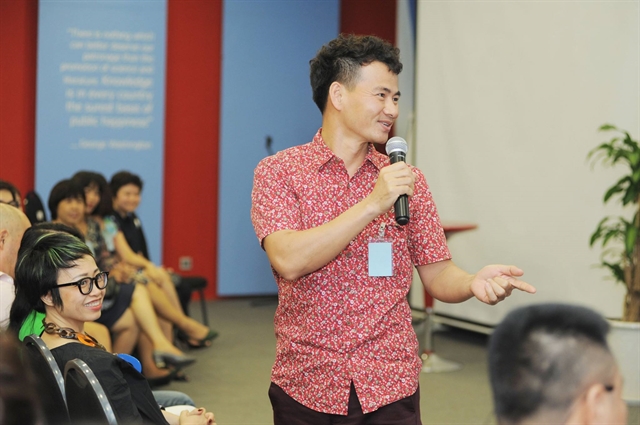[ad_1]

HÀ NỘI – A conference on protecting intellectual property (IP) entitled ‘Creation: Value and Protection’ was held on Tuesday at the American Center, 170 Ngọc Khánh Street, Hà Nội.
The event, organised by American Motion Picture Association (MPA), AnSinh Group and IPCom Việt Nam, aimed to raise awareness of the importance of protecting IP in the context Việt Nam has joined the Comprehensive and Progressive Agreement for Trans-Pacific Partnership (CPTPP), as well as amid the rapid growth of digital technology, software, arts and entertainment.
Participants said digital technology and arts creation needs involvement from investors, creators and artists.
They also said recognising each party’s role in IP relations is key to avoiding conflicts and to creating a healthy environment in order to boost cultural and arts development and publicise national heritages.
The conference was held during the annual World Intellectual Property Day celebration (April 22 to 27), created by the World Intellectual Property Organisation (WIPO) in 2000 to highlight the role IP rights play in innovation and creativity.
The conference attracted guests from the US embassy, representatives of the MPA and speakers who have built their names in arts, cinema, technology and civil laws.
Speaking at the conference, South East Asia Regional Director of Operations for MPA and copyright lawyer James Cheatley said IP Day was made to celebrate film making.
“I really hope it is IP Day every day. This is a chance for us to stimulate entertainment, story telling, and acknowledge the creating of film making. I have joined film teaching classes and competitions with students in Hồ Chí Minh City during my time here. Throughout this event, we see how the quality of Vietnamese film industry is becoming, how much cinema contributes to the world economically and spiritually. It takes us to a new world, the centre of imagination we can leave to the young generation. Copyright is combination of culture and fundamental law.”
Host Phan Cẩm Tú from the American Center noted that copyright and IP rights in Việt Nam are often violated, and is no strict legal framework to protect those rights.
“We all know some trendy movie websites in Việt Nam have heavily committed it by stealing movies and showcasing them without permission from original makers. Even a logo is also an IP. The products of the intellect are values and how do were protect those values?” he asked.
Comedian Nguyễn Xuân Bắc gave an example of his name being used in many commercials without his permission.
Stage director and screenwriter Nguyễn Việt Tú added to the violation issue, saying in Việt Nam, many artists do not care about copyright and even help copyright violators.
“I have been to the US from an early age to have a sense of how film industry is made. In Việt Nam, we have lots of potential to grow, but we also face barriers of society awareness. People use stolen products naturally and that kept us from growing up. Each time I mention copyright, my colleagues look at me like aliens, and my customers stay far away,” he said.
According to CEO of ADT Creative Phạm Ngọc Mai Anh, for a while, the idea of using stolen, cracked software has been common among young people
“When we need anything, we will Google to download cracked products before thinking of paying for them.
“At present, technology start-ups of Việt Nam are growing tremendously, but their success is quite humble, as they lack a developing environment. If we wants to grow in a healthy space, making the most of our creativity and intellectual, we need to appreciate people who own them. Therefore, they have motivation to invest their time, energy and money to make good products, not only selling their labour to foreign employers.”
Attorney Quách Minh Trí from Baker Mckenzie Việt Nam concluded owners of IP needed to be protected in reality, not on paper.
“One obstacle for owners is they have to find proofs to show their properties were stolen legally by an individual or a organisation,” he said. — VNS
[ad_2]
Source link
